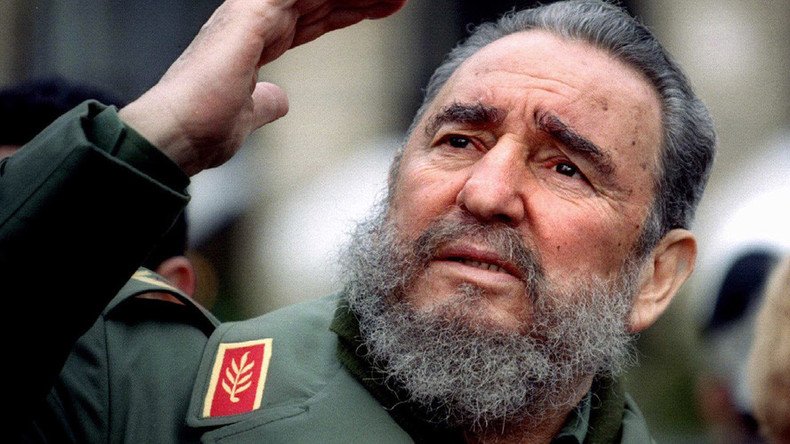US President-elect Donald Trump’s statement on Fidel Castro's death was probably the harshest, branding the Cuban leader “a brutal dictator who oppressed his people.” RT has asked political analysts what that could mean for future US-Cuba relations.
‘No olive branch’
Eva Gollinger, author and lawyer, said that Donald Trump’s recent statement “certainly was in no way sending an olive branch over to the Castro government.”
“In fact it was doing the opposite by referring to Castro in such harsh and aggressive terms, as he did, which I won’t repeat. It is certainly something that will offend and insult the Cuban people in Cuba, as well as the Cuban government,” she told RT.
“Trump has also said he would roll back most of the agreements and the initiatives that Obama has achieved so far working together with the Castro government,” said Gollinger, and “it is not a result of Fidel’s passing.”
“I think Fidel was right though, and I agree with his analysis... referring to the Obama government,” Gollinger told RT.
“He knew this US government very well, and he survived through 11 presidents, and through hundreds of assassination attempts led by the CIA. He was able to resist and overcome them through his own intelligence and through the battle of ideas,” she added. “He knew not to trust the US government, as having been a victim of it at not just the time of the Cuban Revolution, but before. That would be the sort of cautious position to maintain on the Cuban side.”
Answering the question of what kind of relations one can expect now, Gollinger said that she does not expect change with the death of Fidel Castro.
“Castro hasn’t been head of government in Cuba since 2006, basically. Even though many speculated that he was running things behind the scenes... not in the latest years, because of his health,” she told RT.
“We know the position of Raul Castro, because he has been the one heading that drive towards a better and more open relationship with the US. The problem here is not the Cuba side, it is the US,” she added.
‘Statement on oppression from country with white supremacy system’
Tariq Nasheed, documentary filmmaker and activist said that it is very contradictory for President-elect Trump to make that statement about oppression.
“We’re living in a system of complete white supremacy here in the US, where black people are totally and completely oppressed. Especially now under Trump, it is going to get more intensified,” he told RT.
“There has been the rise of anti-establishment figures all around the globe recently. In the US, for example, Bernie Sanders inspired people with his socialist agenda.”
Answering the question if Castro is still a source of inspiration for a new generation of socialists, Nasheed said that Castro has done a lot of great things for African people around the globe.
“He helped in apartheid in South Africa. He helped the African nation Angola gain their independence. He helped the African nation Ethiopia fight wars. He offered to help African-American people during Hurricane Katrina, where Black people were floating up and down the streets for a week out here in the US. He offered to help, he was turned down. Castro also offered African-Americans free scholarships to go to Cuba and to get medical training. So he’s reached out to people like Malcolm X. He’s been revered in the Black community globally,” the filmmaker told RT.
‘Business as usual’
Solomon Comissiong, host and founder of Your World News Radio Show and Media Collective, told RT that Castro's death and Trump's new presidency are not going to change the future course of relations.
“It tells me that it is going to be business as usual. It is going to be the same as it was with all the previous US presidents,” he said.
According to Comissiong, the recent President-elect's comments on Castro are reprehensible and littered with lies and hypocrisy. “We look at the US – a country that’s riddled with social injustices, especially against people of color,” he continued.
“We look at the fact that before the Cuban Revolution, which was consummated in 1959, before that, Fulgencio Batista was the brutal dictator, and was financed by the US, supported by the US,” Comissiong told RT.
“Why? Because he allowed the US government and corporations to come in there and run roughshod and to control mass swaths of natural resources from Cuba,” he added.
“We’re talking about the US that has gone through the world globally through the last several decades destabilizing democratically-elected leaders, destabilizing governments across the globe, eviscerating human lives by imperialist wars, bombings, drone attacks...” Comissiong said.
“It’s laughable for the US to sit there and lecture anybody," he concluded.
Vito Echevarria, CubaStandard journalist, believes it is not in Trump’s interest to sever ties with Cuba, as he is interested in doing business there.
“Firstly, I wouldn’t take those comments from Trump very seriously. If you look at his track record, him and his associates, they have basically built a track record of doing a lot of research, investigating the idea of doing business with Cuba, going back into the late 1990’s,” he told RT.
He believes that at some point Trump will take a serious look at Cuba’s real estate development and tourism.
“Basically, that is the main industry in Cuba these days, now that sugar is no longer a huge priority with that economy,” he added.
The statements, views and opinions expressed in this column are solely those of the author and do not necessarily represent those of RT.

